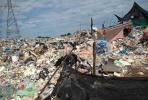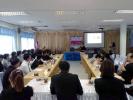
Latest Results on Water and Health case study (Thailand)
This case study addresses health impacts of waste and water resources management at the provincial and municipality levels in Thailand (Ayutthaya)..
THAILAND LONG TERM STUDY WATER MANAGEMENT AND HEALTH IMPACT (with a focus on wastes management)
"Contribute to a better management of adverse health issues, linked to poor management of water and wastes for communities and at a provincial level"

Solid wastes are a major problem in Thailand, in fact according to the Pollution Control Department’s statistics in 2013, the amount of solid waste all over Thailand was 26.77 million tons with 6.93 million tons which are not properly managed or disposed. Moreover the number of solid wastes seems to increase with 2 million tons more between 2012 and 2013.
When solid wastes are not well managed, it can have an important impact on human health and environment with problems like:

ComAcross project has conducted a survey and collected preliminary data in Phra Nakhon Si Ayutthaya by Participatory Epidemiology method. In fact, Phra Nakhon Si Ayutthaya has been chosen to be a pilot model for proper waste management and will be a role model for other provinces in the future. (Public Affairs DivisionOffice of the Permanent Secretary,2015)
The first phase of investigation that has been conducted March-May 2015 in parallel of the participatory epidemiology capacity building activities has been implemented in collaboration with the government officers at municipality level in Chiang Rak Noi Sub-District, Bang Pa-In District. 2 stakeholders workshop aiming at the restitution of our findings with the local stakeholders have been organized (14th May, 29th May). It has been followed by the organization of 2 stakeholders’ case study workshops involving agents operating at provincial and district and municipality level in Ayutthaya (3rd July and 9th October).
As a result of the participatory assessment of health risks perception at municipality level, the focus of the case study has been set on waste management (both livestock farming wastes and solid waste) and their impacts on animal health, human public health and the environment.

Several researches have been done, in 2016, in the framework of this case study in order to assess the risk of bio-physical contamination due to poor coordination in waste management at the municipality and provincial level. These results will feed the participatory process involving provincial and municipal stakeholders and aiming at the improvement of cross-sectorial collaboration in a One health perspective. Feedback meetings have already been organised, the last one was in November 2016.
The main results of 2016 studies are listed here below:
The zoonotic bacterial analysis, done so far, demonstrated the presence of Escherichia coli and strains of streptococcus in the faeces, floor swabs and water of house sewage, farm sewage and cesspool from the 3 pig farms analysed. Salmonella strains were also found in the cesspool of every farm.
The assessment of pollution was done by collecting samples from 6 different landfills. It established the presence of heavy metal (Fe, Mg, Al) in every landfill analysed, the presence of Salmonella in 4 of them and Clostridium Perfringens in 2 of them. The water from these landfills was characterized by a contamination with Coliforms bacteria and a high level (but not above the recommended limit) of iron (Fe).
The study of risk area for solid waste landfill or open dumb in Ayutthaya province combined the data from flood’s frequency, distance from residential area, soil drainage, distance from water body streams and wells, and the position of the main cities. It determined that 84% (2138.44 km2) of the Ayutthaya province are risk areas to set a waste landfill and 16% (406.93km2) could be potential areas.
OBJECTIVES
Cross-sectoral collaboration on adverse health issues management in Phra Nakhon Si Ayutthaya in Thaïland :

This case study addresses health impacts of waste and water resources management at the provincial and municipality levels in Thailand (Ayutthaya)..

The 11th of November was held in Ayutthaya a meeting, in the framework of the Thai case study about water and Health management.

The collaboration between Kasetsart University and Mahidol University has been reinforced in the framework of ComAcross project, in order to manage environmental health and waste ma

The prior objective of this case study, when research started early 2014, was the impact of the floods on human and animal health, but after several participatory epidemiology sessi